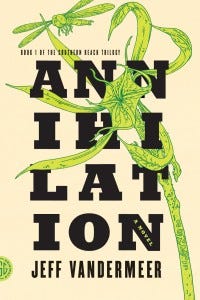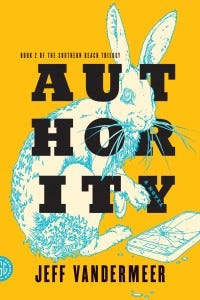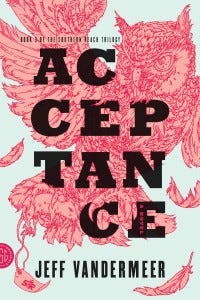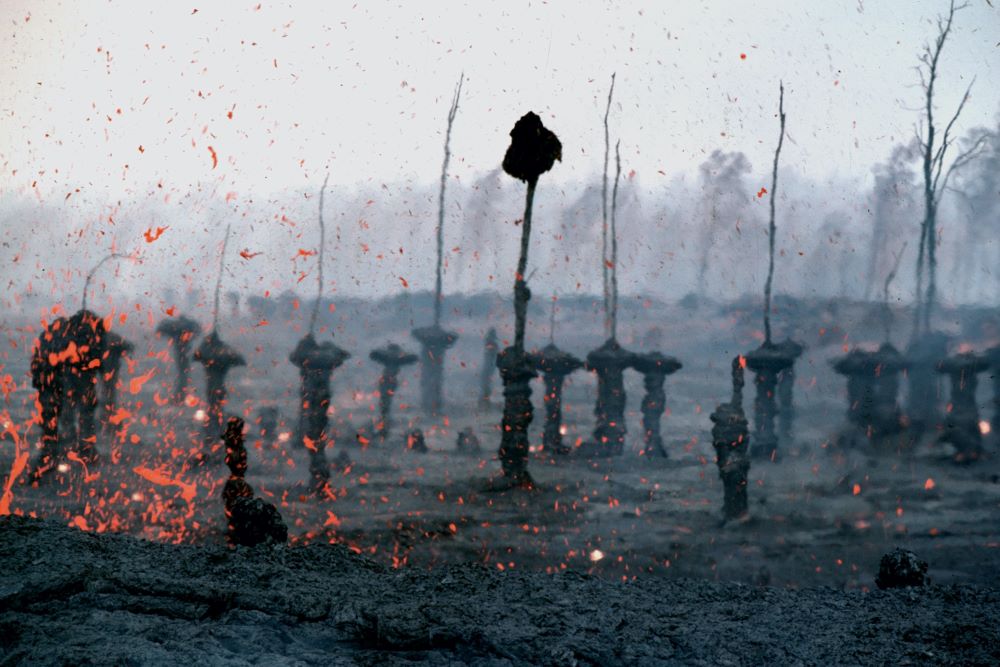interviews
INTERVIEW: Jeff VanderMeer, author of the Southern Reach trilogy

by Matthew Rossi


Known as much for his work as an editor and literary critic as for his fiction, Jeff VanderMeer has long been a champion of the New Weird movement and of breaking through the invisible borders between literature and genre. His most recent series, The Southern Reach Trilogy, explores the environmental and cultural consequences of a biocatastrophe in a place called Area X. The series is at turns a terrifying, hilarious, and philosophically profound look into the failure of people and institutions to respond to enormous tragedies. The final installment, Acceptance, was released by FSG on Saturday.
Matthew Rossi: The Southern Reach trilogy is the second of your trilogies I’ve had the pleasure of reading (the first being the Ambergris trilogy; full disclosure, I’m a fan). Reading the Southern Reach trilogy, I’m consistently struck by the way in which location becomes a living — often hostile — presence in your work. Certainly this is true of Area X, but the inscrutability of the Southern Reach building, the groupthink of its employees also sets up a kind of hostile, self-driven setting. What role did the setting play in conceiving of this trilogy? Do you think of it as a character, in the sense that it has mind and agency?
Jeff VanderMeer: There are a few different answers to that question. One concerns the real world as we know it. Our environment contains much that’s invisible to our senses that permeates the landscape — that actually permeates us as well. Microbial life, parasites, creatures in symbiosis, things that live in the air. Plants, too, are communicating one to another and insects through pheromones. There are latticeworks and cathedrals of conversation that we’re unable to “hear.” We have fairly primitive sensory data coming in on all of this, and this means we misunderstand our environment from the moment we’re born. If we sometimes feel a prickle on the edge of our senses it may be that some part of our reptile brain is experiencing a ghost of an echo of the complexity that truly surrounds us. So, that’s one answer.
Another answer is that landscape in fiction always comes to us through the character viewpoints. One person has heard gunfire so much it doesn’t really register in the same way that someone living by a highway doesn’t register the sounds of traffic at night. While another person does. Two people walk through a pristine wilderness. One notices the biting gnats and the mud and the ache in their knee. The other notices the night heron high on a branch and the way the pine forest transitions to swamp and a particular type of dragonfly.
A third answer, specific to these novels, is that when dealing with an Unknown, it is possible it may already be acting through those invisible interstices that you cannot sense and if so, then perhaps the landscape’s already spying on you.
It is worth noting that the biologist in Annihilation doesn’t see the natural environment as threatening at all. The clearest sight is the kind that understands that even when we think we are removed from the natural world that in fact we never have been and never will. I’d also point you to this short piece by Steven Shaviro, which reflects very accurately my own thoughts about environment and our place in it: http://www.shaviro.com/Blog/?p=1253

MR: You’ve talked in previous interviews about using the trilogy to create an expanding lens. Between Annihilation and Authority that’s evident when you move outward from Area X to look at its impact on the community surrounding it. Was there a concern that in returning to Area X in Acceptance you’d risk narrowing that lens again or else be forced into a position of offering up too many direct answers to the mysteries you’ve set up?
JV: It would have been very easy to write three Annihilations that each pushed forward the narrative to various answers, but not very interesting to write and to some extent cynical. I was more interested in giving readers something different with each novel, and a different “trilogy” overall, too. So I did have some concerns about returning to Area X if I couldn’t offer something different, but it seemed to me that the perspective taken allowed for a return that was a departure from what had gone before. I definitely wanted to get the ratio of remaining questions to answers given right. Too many direct answers would’ve undermined the inquiries at the heart of the novels. But too few would seem like a cheat. So there are some direct answers and some that readers have to piece together. I will say that most everything is in there, in Acceptance, even if some is hidden a little bit. What I have to accept is that some readers will find too many answers and some readers too few. But that kind of comes with the territory in this case. Given the series is also exploring the idea of subjectivity and competing ideologies or narratives, that’s probably appropriate.
MR: It seems that a lot of what drives that complexity of that shifting lens is the way in which perspective floats with increasing readiness from book to book. How did the choice to shift perspectives in this way come about?
JV: It was always implicit in the idea of a widening lens. I’ve never been a fan of repeating the same scenes from different character points of view, except in a very limited way, because I find that boring as a reader. But the idea of advancing the plot while also exploring how your perception of a person/character changes as a result of seeing them from a different vantage point appealed quite a bit. The trick was to ensure that the character arcs by the end of Acceptance were complete and satisfying. You don’t want things to just seem to drift off into the ether.
MR: I was fascinated by your use of second person to tell the Director’s chapters in Acceptance. It struck me as a risky move, but the payoff is extraordinary. Can you comment on this?
JV: I use second person when I want to get close-in on a character point of view and third or first person doesn’t seem adequate or offers challenges that seem insurmountable. But also in the director’s case she frames the narrative and somehow second person seemed to fit that. I think second person is really misunderstood, possibly because in bad examples the writer is saying continually “You this/you that.” Just like first person shouldn’t be all I-I-I, second person requires you to be kind of subsumed in such a way that the reader finds it invisible after a while. I’ve used it twice before, once in a short story and once in my novel Veniss Underground. It may throw some readers out of the story, but for the rest, the payoff, as you indicate, can be very satisfying. In a sense, you join the director on her own expedition through all of the obstacles in her way, you identify with her more than if I’d used third or first person. There’s also an ethereal quality to second person, when you use it correctly, that seemed to fit the situation.

MR: To a great extent it seems that Acceptance is a book that deals with memory and regret, where the other books exist much more in the immediate moment of the plot. Does this stem from any particular philosophy or approach you were working with?
JV: I was working from the idea that Nothing Will Be the Same Ever Again. I’m not a fan of things returning to status quo when it’s clear they can’t — it’s a cheat on the part of the writer, it’s saying “I’m going to take you out to the edge of the cliff, and we’re going to jump off the cliff, but half-way down there’ll be a net and in the end everything will be as it was before.” That’s ludicrous. That’s not real life, either. We survive things. We surmount them. But we’re not the same as we were before, and thus the world isn’t the same either. This isn’t either depressing or upbeat — that’s just how things are, and documenting that can be by measures harrowing, beautiful, uplifting, horrifying, and transcendent. We try, we keep trying, we can’t go on. We go on.
MR: In the introduction to The Weird anthology, Ann VanderMeer and you observe that the weird often exists as a sensation within a narrative more than a specific genre of writing. Can you elaborate on this distinction?
JV: There’s a worldview that exists in the margins, one that partakes of the surreal and a bit of the realistic, one you might call Kafkaesque in one mode in which it is found. It’s at times a tad absurdist and finds the world darkly absurd and tragi-comic. That comes with a sense of strangeness — finds even in the mundane traces of the uncanny. Whether through the elaborate rituals we let govern our lives or the abstract concepts — like money — that come to rule us…the human world is deeply weird. Weird fiction often riffs off of this even if it shows the reader, overtly some supernatural monster or other oddity. It’s saying, in effect, “I’m documenting something that doesn’t exist but I’m also telling you the world around us is stranger than you think.” That’s why it can be a sensation within a narrative. It’s imbuing the text with a viewpoint, immersing the text in that viewpoint, not just overlaying the peculiar in a plotted sense. It’s all the way down into the substrate — the subtext. You can’t really fake it.
MR: It occurs to me that this must have been a fairly quick writing process. Was there an advantage to knowing they would have a rapid release? Did it allow you greater freedom to conceive of them as a single object?
JV: I still really see them as three novels and I’ve been perplexed by those who have suggested these are one novel that’s been cut up into pieces. I suppose that’s in part because, to me, the story arcs of the main characters in each are self-contained within each novel. I suppose you could argue that Control’s story arc continues into Acceptance, but I always saw it as his role and Ghost Bird’s being reversed. Once Acceptance starts, he’s almost Ghost Control, there’s such a reversal of the power balance between the two.
What gave me the greatest freedom is knowing they were coming out from FSG Originals and that Sean McDonald was my editor. I can’t lie here — there are other scenarios I can think of where there would have been pressure to be more conventional. But having the support I had, and the kind of support was critical to being able to relax into writing these novels the way I wanted to write them. Sean’s developmental edit notes were also crucial. I’ve never had a better editor. I also had more total hours to work on these novels than ever before — just in fewer days than most times before. So mostly I pulled out a whole bag of tricks to gain perspective, to get to the same point of objectivity as I would have if I could have put, say, Authority, in a drawer for a month and then pulled it out and looked at it with fresh eyes. And sometimes, too, I used the intensity of needing to finish a scene or section by a specific date — channeled it into the prose. I’ve been a writer for over 30 years now and thankfully I’ve got lots of ways of tricking my brain into getting what I need out of it.
I’ve been a writer for over 30 years now and thankfully I’ve got lots of ways of tricking my brain into getting what I need out of it.
MR: Would you approach another project this way?
JV: That’s hard to say, because the next two or three novels are stand-alone and they’re very different from the Southern Reach trilogy. The process has been different every time, because I don’t like to repeat myself and I don’t like getting locked into one way of doing things — I want to be able to have a process that’s malleable to the situation, to what’s best for a particular novel. One thing I know for sure: If I start a novel and it doesn’t feel like the first time, like I know nothing, even if I know quite a lot about writing now, then I am suspicious. When I sit down to write a novel and it feels too familiar, I’ll know I’m beginning to repeat myself, and I’ll know I’ve entered the inevitable decaying orbit. But it hasn’t happened yet.









